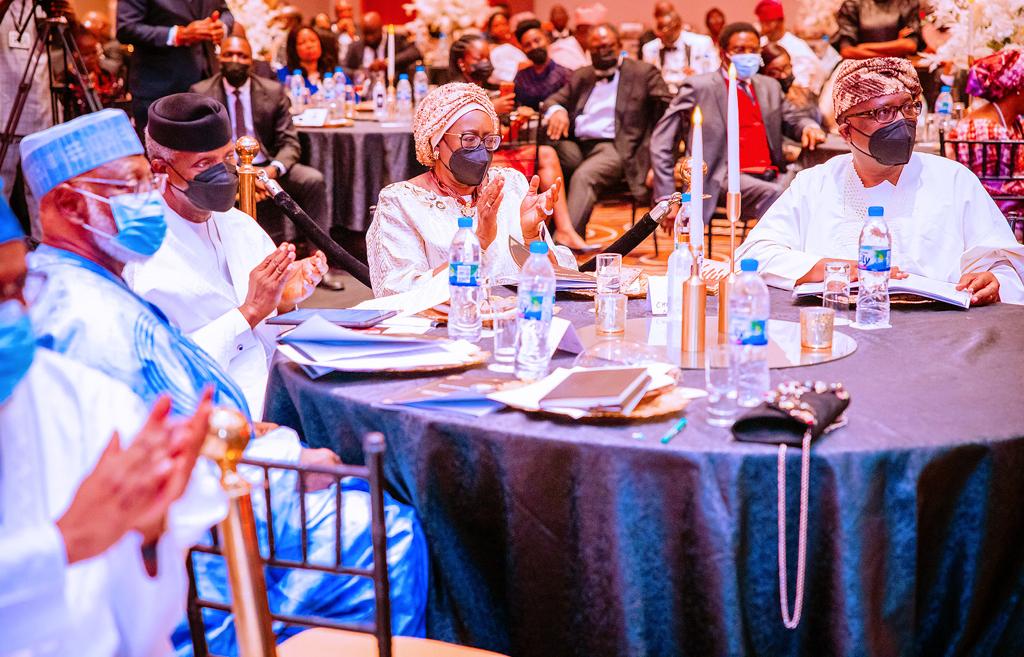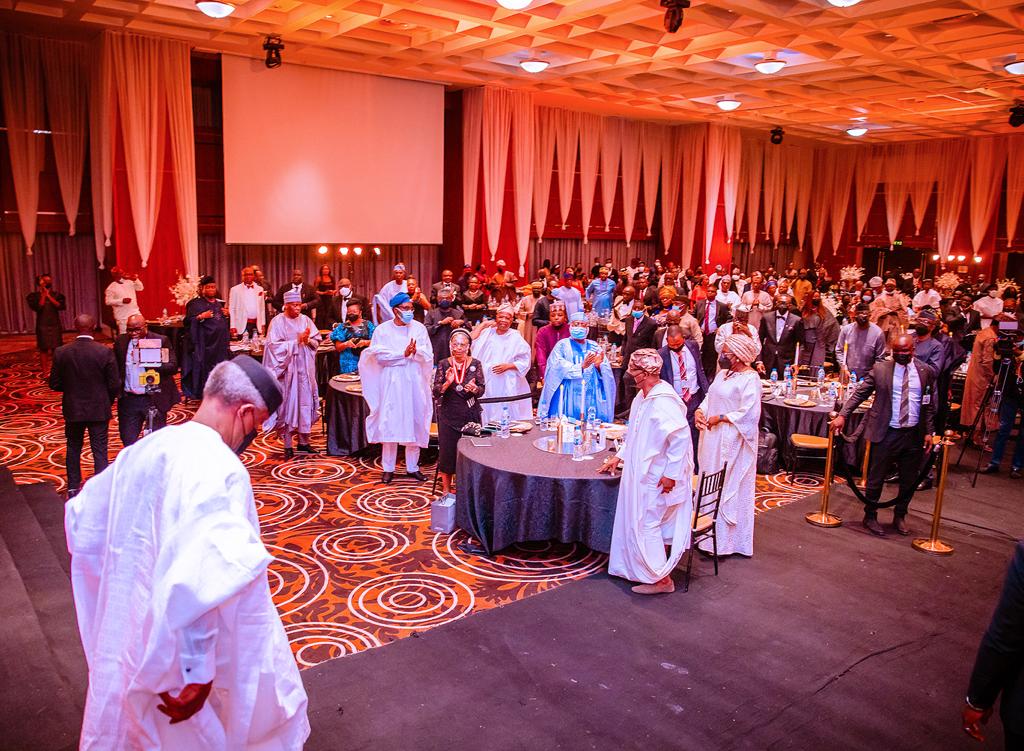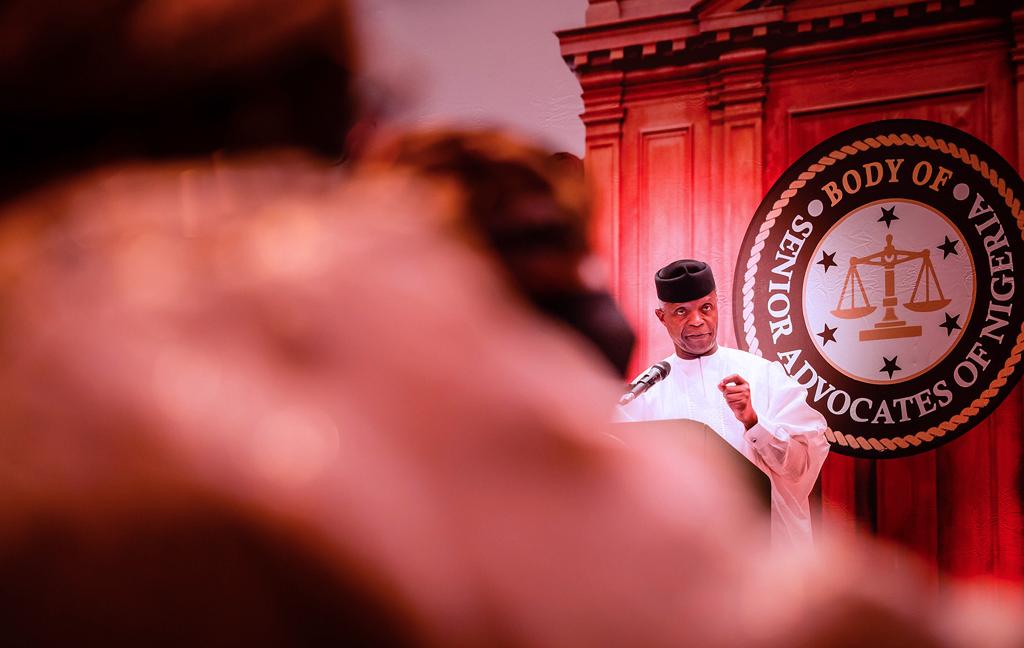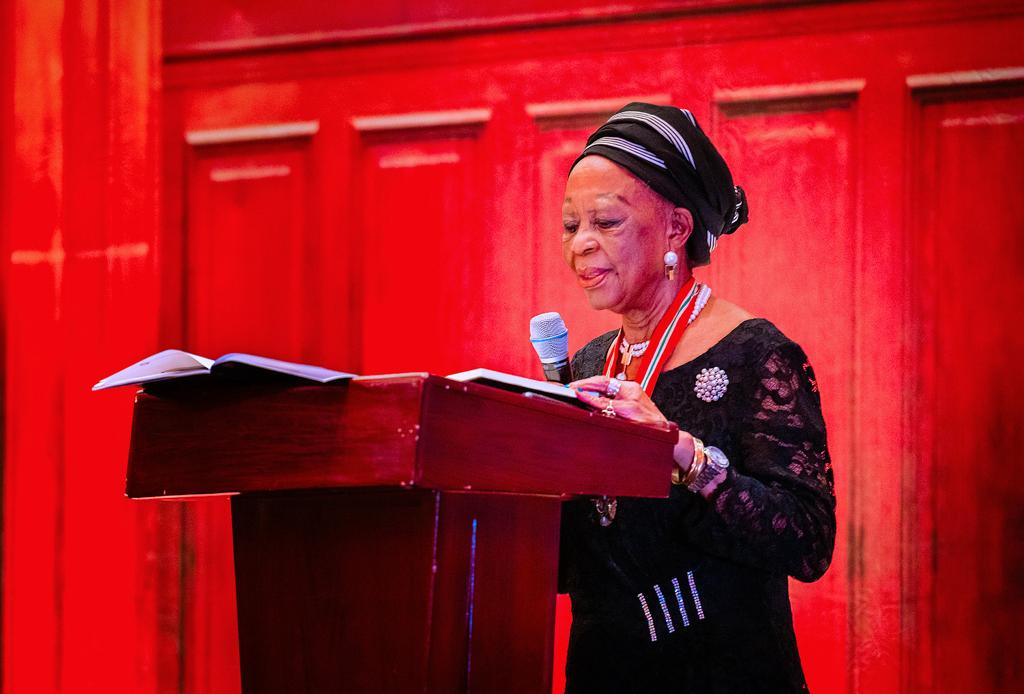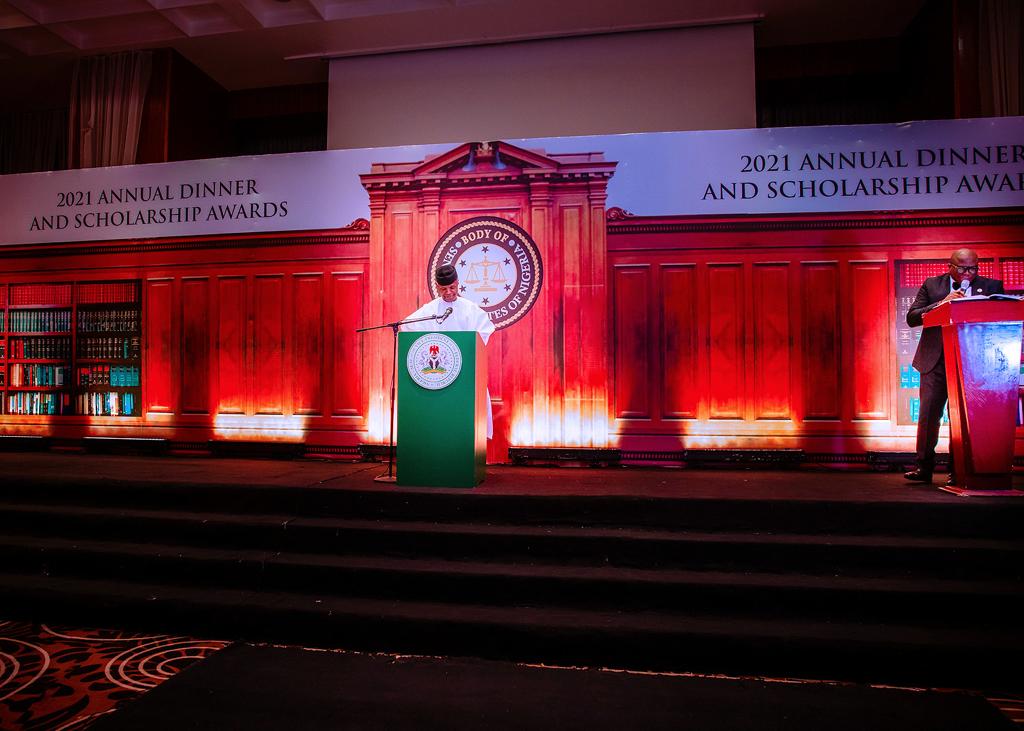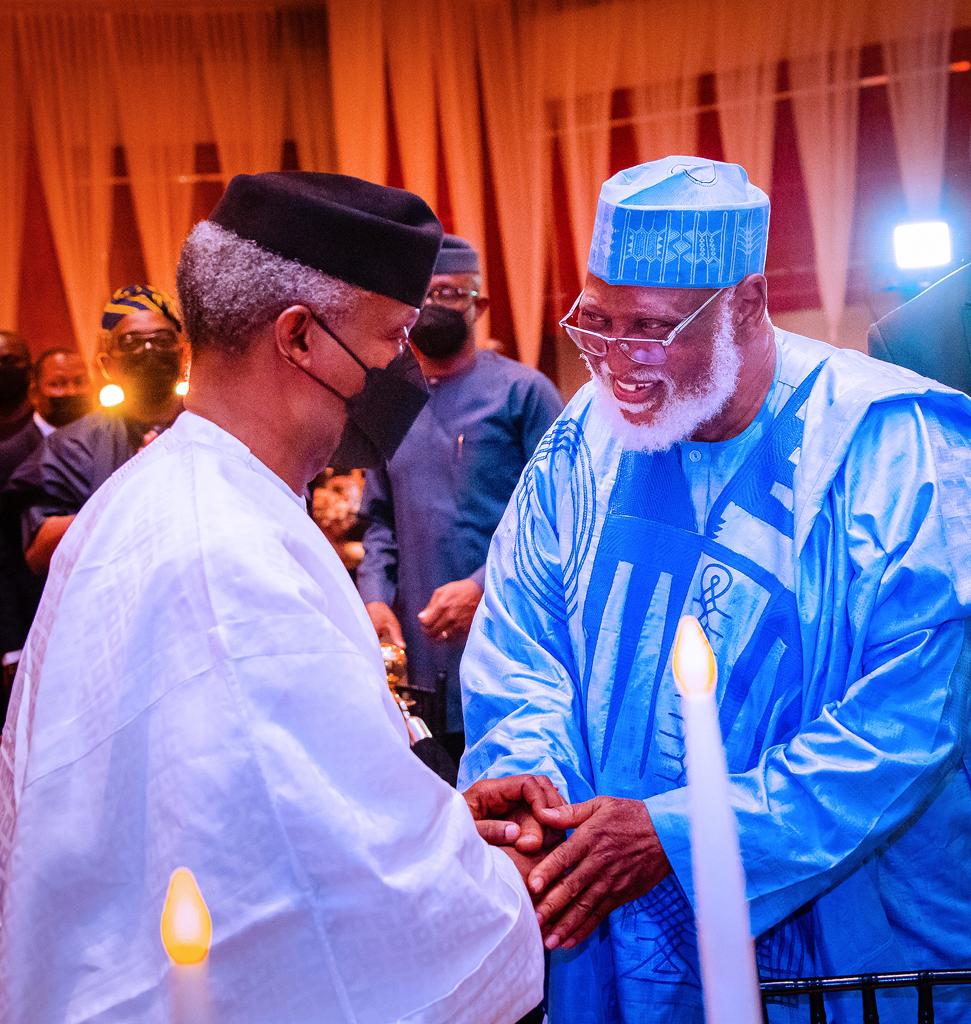Body Of Senior Advocates Of Nigeria (BOSAN) Annual Dinner & Scholarship Awards
REMARKS BY HIS EXCELLENCY, PROF. YEMI OSINBAJO, SAN, GCON, VICE PRESIDENT OF THE FEDERAL REPUBLIC OF NIGERIA, AT THE BODY OF SENIOR ADVOCATES OF NIGERIA (BOSAN) ANNUAL DINNER AND SCHOLARSHIP AWARDS, HELD AT GRAND AFRICAN BALL ROOM, LAGOS CONTINENTAL HOTEL, ON THE 29TH OF JANUARY 2022
PROTOCOLS
After listening to the evergreen and always on point Chief Mrs Folake Solanke, SAN, (and who will believe that she is 90 years old this year, if we can look like this at 90, we should thank the Almighty God) and earlier the Chief Justice of Nigeria ably represented by Milord Justice Kekereekun, and then listening to the very engaging and thought-provoking lecture by His Excellency, General Abdulsalami Abubakar, GCFR, I doubt if colleagues have any appetite for any heavier discourse especially as dinner appears to be slightly delayed.
Let me add my voice to congratulate the newly preferred Senior Advocates for the attainment of this prestigious rank. I particularly wish to congratulate and commend Professor (Chief) Ajagbe Toriola Oyewo, whose resilience and persistent determination in the pursuit of excellence had him donning the silk at the age of 91.
This nonagenarian’s story of hard work and perseverance is one that would be told for generations to come. And that is as it should be. The incredible power of hope and the unfailing laws of sowing and reaping have been so decisively proven yet again. Congratulations sir!
The visioners of the Body of Senior Advocates of Nigeria, BOSAN, had indicated from the beginning that we did not intend to be a typical elite club in the legal profession who would not go beyond simply enjoying and relishing our privileges. Our role goes beyond that and it is imperative that we lead the way in deepening discourse on, and championing reforms that will continually uplift the prominence and prestige of our profession.
Some of the reputational damage suffered in recent times by our profession and our system of justice could possibly be avoided with rigorous and sustained introspection on our part.
Apart from the roles of the Bar in the development of an effective and efficient justice sector, eloquently outlined by the Guest Speaker, there are two areas which I wish to recommend for us for reflection.
The first area has to do with the Nigerian Law School and what its future should be. Every year, thousands of students enrol for law school; most of them have to live in poor accommodation spaces, the classrooms are full and will only become more so in the years to come.
There is no country with the number of law graduates we have yearly that still provides in-person lectures and accommodation for those taking bar examinations. Generally speaking, professional examinations do not provide residential training.
This is why I think the suggestion by some that we scrap residential training and enable law graduates to register online for bar exams, be provided online resources for training, mock trials, appearances in court, how to make applications in court, and all of the various things that we teach, can now be done without being physically present in a classroom.
We can do all of these and ensure those who want to take the bar examinations in Nigeria can do so from practically anywhere in the world, the attachment is probably the only thing they may need to do (physically).
It is important that we would not allow a situation where the crisis we are experiencing today, with far too many men and women in the classrooms and accommodation continue to be a problem, subsist for much longer.
Still on the issue of legal education, how can BOSAN help in stemming the falling standards in the quality of legal education which ultimately translates into a dramatic decline in the standard of legal practice? While the Nigerian Bar Association is conscientiously advocating and supporting continuous legal education for legal practitioners, the problems we see in our courtrooms today unfortunately are those that emanate from inadequate or defective legal training. In some instances, from the basic levels of instructions.
We, in our various ways, have developed schemes through which we offer community service, be it in the form of pro bono legal service to indigent litigants or undertaking projects for the benefit of our surrounding communities. When it comes to legal education, I believe that BOSAN is in a position to offer something that may be better.
The partnership of BOSAN with the Council for Legal Education and some faculties of law perhaps, on a pilot basis, for the provision of additional instructional support, will not only be useful to the students of those universities, but also to some of the law teachers who may require mentorship.
I recall how My Lord, Honourable Justice Amina Augie, JSC, CON, while serving on the Bench of Sokoto State judiciary, graciously accepted, pro bono, to serve as an associate lecturer at Usmanu Danfodiyo University, Sokoto. Imagine the students’ excitement and enthusiasm and most importantly the expertise and experience that instruction by members of our body will bring to the classrooms.
Only a few of our undergraduate students benefit from the tutelage of those of us who are traditionally within academia.
The second issue has to do with the role of the Body of Senior Advocates and the Bar Association in ensuring discipline amongst our members. There is a growing perception that some of our colleagues have developed unhealthy relationships which are meant to influence cases before our courts. It is now becoming the case that even many younger members of our profession do much the same thing. I think it’s time to commit to calling out those whose actions demean the rank of Senior Advocate and ensure they are brought before the appropriate disciplinary body.
As I close, permit me to leave us with one thought; our system of justice is a public resource, it does not belong to the legal profession, it does not belong to the bar or to the bench. It belongs to the people. We, lawyers and judges, are paid operators of a service that our constitution created to resolve their disputes and give justice.
We are custodians, not owners. When this public resource is not working effectively on account of delays, or it is being discredited by corruption, we the operators have a moral, legal and civic obligation to fix it.
We must not become defensive or thin-skinned. If we do not fix it, we would have failed in our most important task, we would have failed the people. To borrow from the scripture in Proverbs 31:8 that Chief Mrs Solanke, SAN, quoted, we would have failed to speak up for the voiceless and vulnerable.
Every one of us seated here today knows that there is a lot wrong with our system of justice today, history beckons us to fix it.
I congratulate the leadership of the Body of Senior Advocates of Nigeria for sustaining this initiative and for instituting a scholarship scheme. It rewards excellence for students in law faculties.
I wish our new members a prosperous practice in the inner bar.
Thank you very much, God bless you all.


